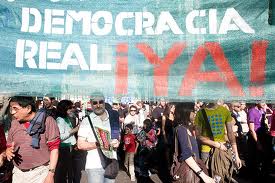Een lezing door Peter Gelderloos
(LEZING IN HET ENGELS / Lecture in English. Description below )
Anarchistische bibliotheek Amsterdam
1ste Schinkelstraat 14-16
tijd: 17:00 (bevestigd!)
Wat betekent het als de meest vrije en progressieve regeringen steeds meer gaan lijken op de totalitaire staten uit dystopische sciencefictionboeken? Als politiek activisten die niet binnen het mainstream kader passen worden vervolgd als terroristen?
De moderne democratie ontstond als een revolutionaire beweging onder de bourgeoisie waarmee ze de steun van het landloze, onderdrukte en uitgebuite deel van de bevolking probeerden te winnen. Hun doel was daarmee de aristocratie te destabiliseren om zo de heersende klasse open te breken en voor alle rijke mensen toegankelijk te maken, niet slechts voor mensen van adellijk bloed.
Het mag dan ook geen verrassing zijn dat “democratie” een grote teleurstelling werd voor velen die dachten dat het hen meer vrijheid zou brengen.
Nu, in de 21ste eeuw eisen bewegingen zoals Occupy Wallstreet of ¡Democracia Real Ya! de “directe” of “echte democratie” in tegenstelling tot de “representatieve democratie” zoals die er nu is en dat wij als een andere vorm van overheersing zijn gaan herkennen.
Maar de vraag blijft: Is het zo dat representatieve democratie niet democratisch genoeg is of is democratie van zichzelf een autoritair ideaal? Leidt het democratisch ideaal wel tot meer vrijheid en tot zelforganisatie?
Gebaseerd op zijn ervaringen met o.a. de pleinbezettingen en buurt-assemblies in Barcelona zal Peter Gelderloos proberen te laten zien dat directe democratie en representatieve democratie fundamenteel hetzelfde zijn en hoe het democratisch ideaal gebruikt wordt om sociale strijd te pacificeren en beheersbaar te houden.
Peter Gelderloos is anarchist en auteur van diverse boeken waaronder: How Non-violence Protects the State en Anarchy Works.
Self-Organization against Democracy
Modern democracy arose as a revolutionary movement among the bourgeoisie, a way to win the support of disenfranchised, landless, and exploited segments of the population, in order to destabilize the aristocracy and force a broadening of the ruling class to include all rich people, not just those with noble blood. It is no surprise then that democracy turned out to be a great disappointment to those who thought it would bring them greater freedom.
Now, in the early 21st century, popular movements across the world champion the idea of “direct democracy” or “real democracy” as a contrast to the “representative democracy” that we all know to be another form of domination.
The question remains: is the democratic ideal conducive to freedom and self-organization? Is the problem that representative democracy is not democratic enough? Or is the very ideal of democracy inherently authoritarian?
Based largely on the experiences of the plaza occupation movement and neighborhood assemblies of Barcelona, this discussion will explore the ways in which direct democracy and representative democracy are fundamentally the same, and how the democratic ideal enables the recuperation and pacification of social struggles.
Saturday, June 2
Anarchistische bibliotheek Amsterdam
1ste Schinkelstraat 14-16
start: 17:00 (Confirmed!)



Pingback: Gelderloos over democratie en anarchie « Rooieravotr
Pingback: Gelderloos over democratie en anarchie | Krapuul.nl